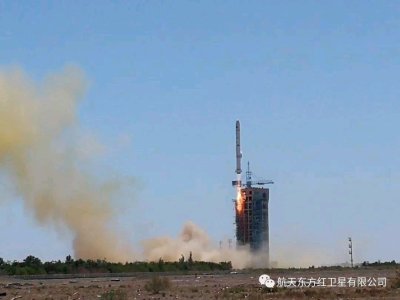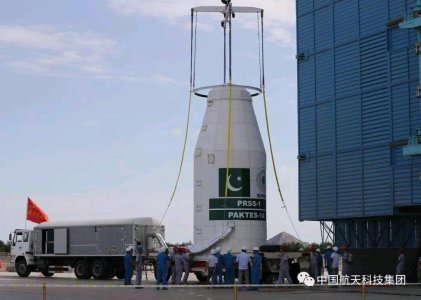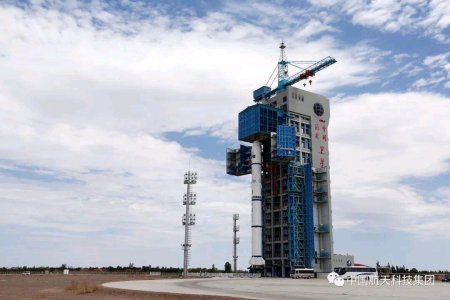UN talkz
First Class Star
- Joined
- Dec 24, 2016
- Runs
- 4,138
The Pakistan Remote Sensing Satellite-1 (PRSS-1) was launched by Pakistan on Monday morning from China's Jiuquan Satellite Centre, the Foreign Office (FO) said in a press release.
The PRSS-1 is the first optical remote sensing satellite sold to Pakistan by China, and the 17th satellite developed by the China Academy of Space Technology (CAST) for an overseas buyer, according to APP.
The 1,200 kg satellite PRSS-1 will operate at an altitude of 640 kilometres and will enable Pakistan to meet its imagery requirements in the areas of land mapping, agriculture classification and assessment, urban and rural planning, environmental monitoring, natural disaster management and water resource management for socio-economic development, the FO said.
Another flagship satellite, the Pakistan Technology Evaluation Satellite-1A (PakTES-1A), which was indigenously designed and developed by Pakistan Space and Upper Atmosphere Research Commission (SUPARCO) engineers, has also been co-launched with PRSS-1 by the same launch vehicle.
PakTES-1A is a 285 kilogram satellite equipped with an optical payload commensurate with national needs. It has a design life of three years and will operate at an altitude of 610km.
The launches are the 279th mission of the Long March rocket series.
According to the press release, the successful launches of the PRSS-1 and PakTES-1A projects at 8:57am today has further strengthened space cooperation between Pakistan and China for future collaboration.
President Mamnoon Hussain and caretaker Prime Minister Nasirul Mulk congratulated the nation on this historic event and appreciated SUPARCO’s scientists and engineers for their technical excellence and untiring efforts.
PM Mulk also assured the nation and SUPARCO of complete support for further advancement in space technology, which he said is vital for socioeconomic development and national security of Pakistan. Our scientists and engineers are a source of pride for the nation and the country, the FO handout added.
The SUPARCO and the China Great Wall Industry Cooperation (CGWIC) signed an agreement for the development and launch of the PRSS-1 in 2016.
Then minister for planning and development Ahsan Iqbal had said that the agreement would transfer space technology to Pakistan and would help the country in the national security arena by strengthening border security and surveillance apparatus.
https://www.dawn.com/news/1418966/china-launches-2-satellites-for-pakistan
The PRSS-1 is the first optical remote sensing satellite sold to Pakistan by China, and the 17th satellite developed by the China Academy of Space Technology (CAST) for an overseas buyer, according to APP.
The 1,200 kg satellite PRSS-1 will operate at an altitude of 640 kilometres and will enable Pakistan to meet its imagery requirements in the areas of land mapping, agriculture classification and assessment, urban and rural planning, environmental monitoring, natural disaster management and water resource management for socio-economic development, the FO said.
Another flagship satellite, the Pakistan Technology Evaluation Satellite-1A (PakTES-1A), which was indigenously designed and developed by Pakistan Space and Upper Atmosphere Research Commission (SUPARCO) engineers, has also been co-launched with PRSS-1 by the same launch vehicle.
PakTES-1A is a 285 kilogram satellite equipped with an optical payload commensurate with national needs. It has a design life of three years and will operate at an altitude of 610km.
The launches are the 279th mission of the Long March rocket series.
According to the press release, the successful launches of the PRSS-1 and PakTES-1A projects at 8:57am today has further strengthened space cooperation between Pakistan and China for future collaboration.
President Mamnoon Hussain and caretaker Prime Minister Nasirul Mulk congratulated the nation on this historic event and appreciated SUPARCO’s scientists and engineers for their technical excellence and untiring efforts.
PM Mulk also assured the nation and SUPARCO of complete support for further advancement in space technology, which he said is vital for socioeconomic development and national security of Pakistan. Our scientists and engineers are a source of pride for the nation and the country, the FO handout added.
The SUPARCO and the China Great Wall Industry Cooperation (CGWIC) signed an agreement for the development and launch of the PRSS-1 in 2016.
Then minister for planning and development Ahsan Iqbal had said that the agreement would transfer space technology to Pakistan and would help the country in the national security arena by strengthening border security and surveillance apparatus.
https://www.dawn.com/news/1418966/china-launches-2-satellites-for-pakistan








